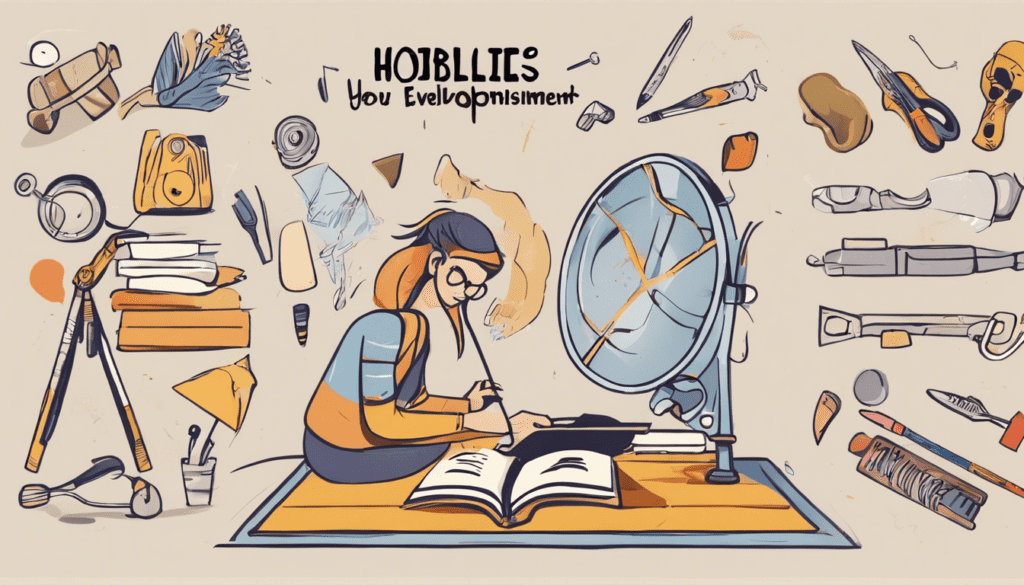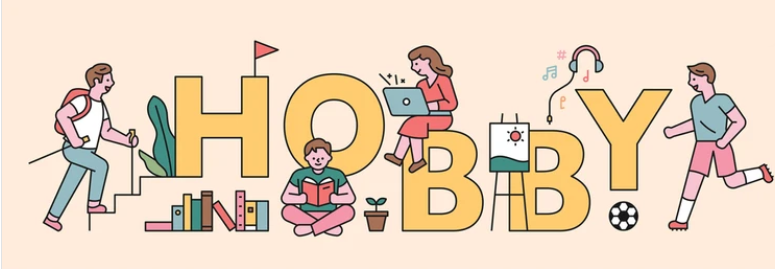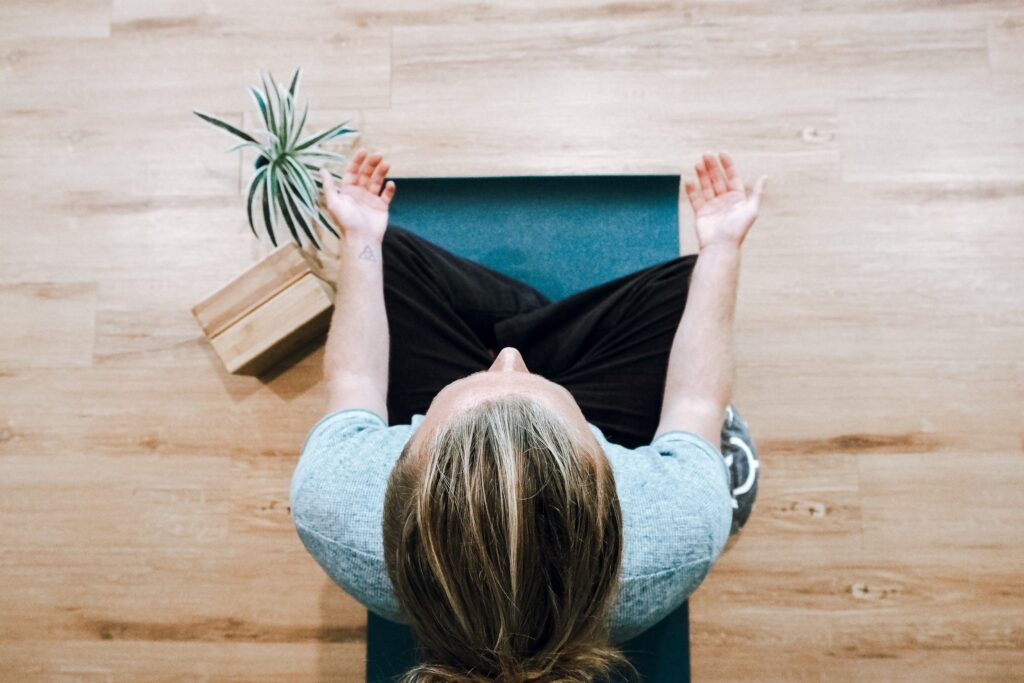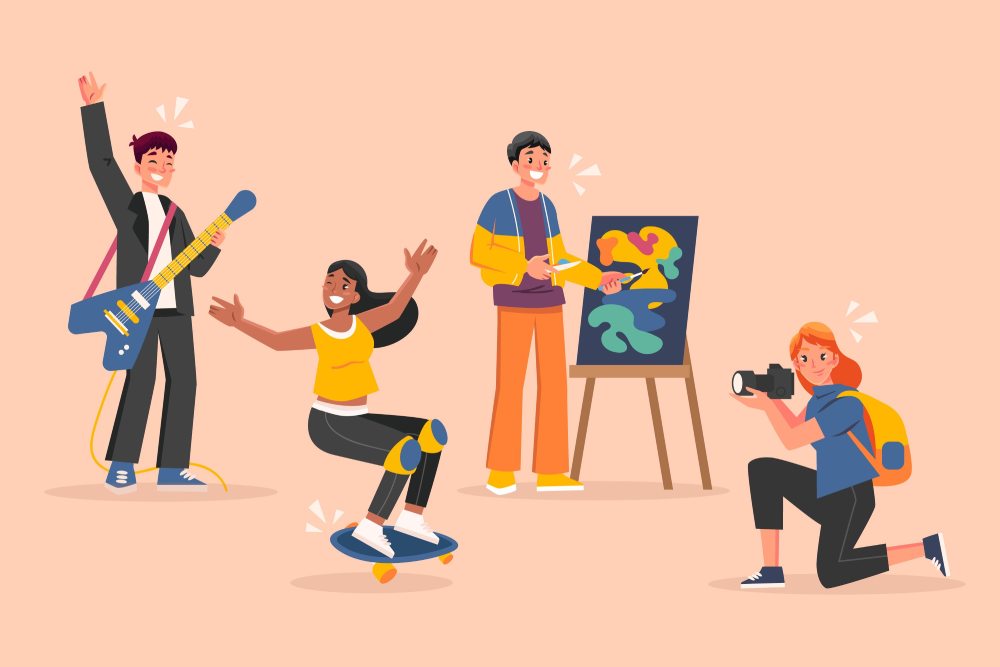Hobbies to Develop: Boost Your Personality and Life Skills

In the fast-paced world we live in, hobbies to develop not only offer a much-needed respite but also play a crucial role in enhancing one’s personality and life skills. Recognizing the importance of hobbies is essential in leading a balanced life, promoting stress management, and fostering a sense of accomplishment. Through pursuing various leisure activities, individuals can discover new passions, improve their mental and physical well-being, and connect with like-minded communities, making hobbies far more than mere pastimes.
In this blog post we’ll hobbies to develop and why it is beneficial to cultivate hobbies. And highlighting how they contribute to building confidence through the mastery of new skills. And offeres relaxation and mindfulness, and fostering social connections within hobby communities.
Why Develop a Hobby?
Table of Contents
Toggle
Developing a hobby offers numerous benefits that contribute to overall well-being and personal growth. Here are some compelling reasons to cultivate a hobby:
Mental Health Benefits
Engaging in hobbies can have a profound impact on mental health. Research shows that participating in enjoyable leisure activities reduces stress levels. In one study, approximately 75% of participants experienced a decrease in cortisol levels (a hormonal marker of stress) after engaging in artistic activities, regardless of prior experience . Moreover, hobbies involving creativity have been linked to an enhanced sense of well-being and positive mood .
Group or team-based hobbies provide opportunities for social connection, friendship, and support, which can alleviate symptoms of depression and anxiety . Additionally, physical hobbies like sports or outdoor activities have been associated with reduced stress, lower blood pressure, and improved overall well-being .
Personal Fulfillment
Hobbies offer a sense of purpose and accomplishment that may be lacking in other aspects of life . As individuals learn new skills and challenge themselves through their hobbies, they experience personal growth and increased self-confidence. Hobbies provide a platform for self-expression, creativity, and intellectual stimulation, which contribute to a fulfilling and well-rounded life .
Furthermore, hobbies can help individuals achieve a better work-life balance by providing a much-needed break from professional demands . Engaging in enjoyable leisure activities can recharge one’s batteries and prevent burnout, leading to greater life satisfaction and happiness .
Relaxation and Mindfulness Through Hobbies

Engaging in hobbies can be a powerful tool for promoting relaxation and cultivating mindfulness. By dedicating time to enjoyable leisure activities, individuals can find respite from the stresses of daily life and experience a heightened sense of calm and presence.
Types of Relaxing Hobbies
A wide array of hobbies to develop offer opportunities for relaxation and mindfulness. Artistic pursuits like painting, drawing, and coloring can serve as therapeutic outlets. And allowing individuals to immerse themselves in the present moment and find solace in the creative process. The repetitive motions involved in hobbies such as knitting, crocheting, and origami can induce a meditative state, promoting relaxation and reducing anxiety.
Outdoor activities like gardening, swimming, and cloud watching provide a connection to nature, which has been shown to have a calming effect on the mind and body. Gardening, in particular, offers the added benefit of exposure to sunlight, a natural source of vitamin D.
Mindfulness Benefits of Hobbies to Develop
Beyond relaxation, hobbies can foster mindfulness, a state of heightened awareness and presence in the current moment. Mindfulness practices have been associated with numerous benefits, including reduced stress levels, improved emotional regulation, and increased overall well-being .
Hobbies that encourage mindfulness, such as meditation, journaling, and creative writing, can serve as powerful tools for self-expression and self-reflection. By providing an outlet for thoughts and emotions, these activities can help individuals process and manage their experiences more effectively.
Moreover, hobbies that involve sensory engagement, like cooking, music appreciation, or even cloud watching. So, It can cultivate mindfulness by encouraging individuals to fully immerse themselves in the present experience
Social Connections Through Hobby Communities

One of the remarkable aspects of joining clubs and groups centered around hobbies and interests is the instant connection that can be forged through shared passions . Whether it’s a book club, a sports team, a photography group, or a gardening club. And being part of a community with similar interests provides a common ground for conversation, collaboration, and camaraderie . Shared experiences and conversations about shared interests create a strong foundation for building social bonds .
Forming New Bonds
When individuals come together with a shared passion, they often find themselves in an environment where they can freely express their enthusiasm and excitement. The mere presence of a shared interest becomes a catalyst for connection, as it ignites conversations and fosters a sense of belonging. Within these hobby-based communities, individuals can find people who truly understand and appreciate their interests.
There is an inherent sense of understanding and acceptance that comes from being in the company of like-minded individuals. It becomes easier to engage in conversations, exchange ideas, and share experiences, knowing that everyone involved has a genuine interest in the subject matter.
Community Engagement
Being part of a club or group offers more than just a shared interest. It provides a support network of individuals who genuinely understand and appreciate our hobbies and interests. Within these communities, a sense of support and encouragement thrives, nurturing relationships and fostering a strong sense of belonging.
Members of hobby-based clubs and groups often share similar goals and face common challenges. Whether it’s mastering a difficult technique, overcoming creative blocks. or navigating the ups and downs of a competitive sport, having a supportive community can make a world of difference. Fellow members offer a listening ear, valuable advice, and practical solutions based on their own experiences. They understand the frustrations and setbacks, celebrate successes, and offer encouragement during challenging times.
Case Studies of Popular Hobbies

Real-life Examples
Numerous influential figures across various fields have embraced hobbies as a means of personal fulfillment and creative expression. Here are some real-life examples:
1) Richard Branson, the founder of Virgin Group, is an avid chess player. He believes chess combines tactics, planning, bravery, and risk-taking, making it the “best game in the world.”
2) Sundar Pichai, the CEO of Alphabet, played cricket in high school and still enjoys a pickup game occasionally.
3) Bill Gates, the co-founder of Microsoft, considers himself an “avid bridge player,” embracing this “old-fashioned” hobby.
4) Jack Dorsey, the co-founder of Twitter and Square, dedicates his Saturdays to hiking, allowing him to recharge and refocus.
5) Meryl Streep, the award-winning actress, finds knitting therapeutic, even hand-knitting a shawl for her role in the movie “Doubt.”
6) Kate Middleton, the Duchess of Cambridge, enjoys coloring as a mindful activity to reduce stress and organize her thoughts.
Success Stories
Engaging in hobbies has proven beneficial for many successful individuals, contributing to their personal and professional growth:
1) Ray Dalio, the founder of Bridgewater Associates, credits Transcendental Meditation as “the single biggest influence” on his life, introducing the practice to his employees.
2) Tom Hanks, the acclaimed actor, has been collecting vintage typewriters since 1978, finding joy in the sound and permanence of typing on them.
3) Sergey Brin, the co-founder of Google, pursues adrenaline-fueled hobbies like roller hockey, skydiving, and trapeze, pushing his physical limits.
4) Marissa Mayer, the former CEO of Yahoo, finds baking therapeutic and scientifically stimulating, creating spreadsheets to analyze recipes. She believes her hobbies make her better at work.
These examples illustrate how hobbies can provide a creative outlet, promote mindfulness, and contribute to personal growth, even for highly successful individuals across various industries.
Conclusion
Throughout this exploration of hobbies and their profound impact on our lives, it’s clear that engaging in these activities extends far beyond mere relaxation or entertainment. Hobbies serve as invaluable tools for personal growth, offering opportunities to develop new skills, boost confidence, and foster mindfulness. Reflecting on the diverse benefits presented—from enhanced mental health and personal fulfillment to the formation of social connections. And the exploration of new interests—it becomes evident that cultivating a hobby is not just a leisure pursuit but a meaningful journey toward a more balanced and enriched life.
In light of the insights and real-life examples shared, the significance of hobbies in shaping our personalities, life skills, and overall well-being cannot be overstated. As we draw this discussion to a close, let us embrace the invitation to explore and engage with our interests more deeply. Whether by reconnecting with a long-lost passion or discovering a new pastime. The pursuit of hobbies promises a rewarding path to personal development, creativity, and happiness. Encouraged by the stories of success and fulfillment, may we all find our unique hobby that not only brings joy into our lives but also enhances our journey through life’s many facets.
Frequently Asked Questions
Q. How can hobbies contribute to personal skill development?
Engaging in hobbies, such as learning a new language, mastering a musical instrument, or woodworking, can enhance your skill set and broaden your knowledge. Hobbies not only offer opportunities for personal growth but also help increase your self-confidence.
Q. Which hobbies are most advantageous for skill development?
There are several productive hobbies that can help you acquire useful skills, including:
- Journaling
- Meditation
- Learning to cook
- Learning to play an instrument
- Playing video games
- Learning a new language
- Photography
- Engaging in square diamond painting
Q. Do hobbies play a significant role in shaping your personality?
Hobbies play a pivotal role in shaping your personality by reflecting and enhancing your interests. They are more than mere pastimes; they contribute to your sense of fulfillment and purpose, allowing you to express the unique aspects of your identity.
Q. What skills can enhance your personality?
Personality development encompasses eight crucial skills:
- Communication
- Problem-solving
- Self-confidence
- Listening skills
- Interpersonal relationships
- Adaptability
- Work ethic
- Leadership
